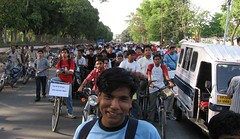Bresson's Diary of a country priest
DISCLAIMER: This is not a review. What I write here are thoughts provoked by this wonderful filmmaker's film.
Bresson is known to make films that make you think. I saw three of his movies this weekend and I thought that his films do make you think. I found all the three to be extremely engaging and interesting but it was one that really made me think a lot.
Diary of a country priest is exactly what the title suggests it to be. The fim chronicles the thoughts and actions of a country priest who writes it down in his journal every day. It is an exploration of faith, the loss of it and the importance of it in human existence. The film makes you think about religion's role in helping human beings tide survive.
A young priest is handed the control over a local parish who is suffering, as we come to know later in the movie, from stomach cancer. He is new to the job and is extremely apprehensive about his duties. His suffering also make him question his faith and his position as the priest makes him a lonely man. As a priest, he is expected to instill faith in his flock. Since he is the man whose job is to make other people guilty, he is universally hated. As the priest of Torcy says, a priest's job is about power and control, and not about love. This makes it harder for the young suffering priest because he has a childish innocence about him which further alienates him from the others. Why? because as explained in the movie, his innocence makes people aware of their sins. He suffocates them and they respond to it with malicious whispers about him being an alcoholic and having handled the Count's wife in an undesired manner.
Alienation of a person from the society s/he lives in usually drives the person to seek solace in something. Usually, that solace is found in faith and the belief that God is out there looking down on you. Another reason that drives one to God is a long standing suffering of some sort. The priest has got both reasons to turn to God besides being obligated to be a Godman. But his unabated suffering makes him question the almighty which he later regrets and at one point, deletes the blasphemous entries from his journal. But what he said has been said and he cannot take it back.
One of the reasons why atheism is hard is because of the fact that since you believe that there is no God, there is really no one to turn to and there is no way to get rid of the depression you are in. By having blind faith, it gives you the courage to tide over the rough waves of life by simply believing in the notion that God is out there looking at you and when He wil do justice. That He would abate your suffering and make you well after some time. Or He would make sure you got a place in paradise. Religion is the best coping mechanism out there (PSY 101). Religion invents a purpose for life and I think humankind would have long gone crazy wihout such a purpose, invented or otherwise. In fact, I would say that the invention of religion was essential for survival of the species because we think too much. We refuse to just eat, reproduce, defecate and die as a matter of fact. The questioning attitude of the human race is unique to it.
When the hard times hit the atheist, who does s/he turn to? Knowing that there is no God, that the world is just a random sequence of events and is inherently unjust makes it extra hard. It is a luxury to just forget the worries, "put the trust in God", and go about working towards your 'purpose' in life.
What an atheist needs is a different coping mechanism that is as good as religion. Is there really one out there? I do not think so. This is the reason the fear of God is inculcated right from childhood. Children are taught not to question God and the scriptures that define God. This way they are best equipped for the future. Most atheist lose their 'faith' when they are faced with hardships. They resist it but soon are consumed by the need for a faith to survive. Agnostics are too easy to bend towards the 'light of God'.
In the film, the priest has doubts about his faith but after having been able to instill faith in another person and having determined that she died having submitted to God's mercy completely, his doubts are dispelled. Because it is his purpose in life to instill the fear of God in other people.
We also see that the priest does not turn away from a young girl whose heart is full of hatred and malice. This I believe is another purpose of religion. According to words ascribed to Jesus Christ, God forgives a person any number of time. He always forgives when you repent. A priest's job is not to banish the sinners but to make them repent their sins. People come close to losing their faiths a lot of times in their lives. It is the job of the priest to get them back into the fold and make sure that they dont completely lose their faiths.
Why does religion ever become problematic? Because human beings are just so imperfect creatures. Blind faith is incredibly dangerous. Mainly because it means that people would accept anything said by the religious in charge, the priest, the bishop, the archbishop, and finally, the pope. Power corrupts human beings. And people in such religious position have the capability to create dogmas that could have severe repurcussions to the working of the society. The religious heads, no matter whom they claim to serve, are actually trying to extend their influence on more people. Sometimes, they don't even realise that.
Human beings destroy everything. Because that is just what we do. Sad, but true. The trick is to accept this fact without getting consumed by it. To be consumed by it is to become corrupt yourselves and losing your idealism.
Bresson's film captures the loneliness of the priest and the mental tussles he undergoes in a superb fashion. You get emotionally attached to the priest. You suffer as he suffers and you get a rare peek into the cold, alien, distant world of the priests who have to be just that because of the very nature of their jobs.
It is a simple film with extremely complicated ideas behind it. It could probably be contrued to be a catholic film but it would be stupid to do that. And it is a fiml that does make you think about spirituality and religion.
PS. I do _not_ think that God exists
PPS. I am yet to find another coping mechanism but by God's grace, I am also yet to suffer. I have been privileged.
, , , ,





